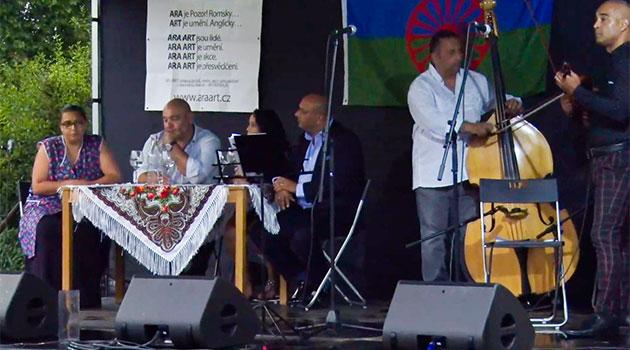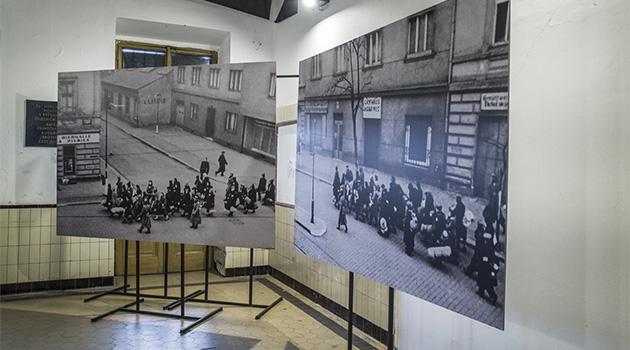Czech Romani group objects to reading names of Holocaust victims who were Romani, those organizing commemorations disagree

The informal Dikhas group in the Czech Republic, which is represented by Libuše Martínková and František Lacko, is claiming that the public reading of the names of Holocaust victims from the Romani community during commemorative gatherings organized by the Terezín Initiative Institute (ITI) is displeasing and embarrassing Romani people. The director of the ITI, Tereza Štěpková, says she believes the group is making the statement because they hold a grudge against her personally and that she has not yet heard a convincing argument as to why it would be disrespectful or inappropriate to read aloud the names of those who were murdered for no reason in the absolutely barbaric way that the Holocaust involved.
Dikhas: Reading the names of the dead in public is not part of Romani culture or tradition
“As members of the Dikhas group, we regularly hold discussions with Romani people about what their idea of a dignified way to honor the memories of Holocaust victims from the Romani community would be. We cannot speak for all Romani people and that is not our intention, because perfect agreement among Romani people on this question does not yet exist,” the group’s standpoint on the issue says, which has been sent to news server Romea.cz.
“However, from our dialogues with Romani people, we have learned that what they consider dignified during commemorative ceremonies is raising the Romani flag, showing respect by holding a minute of silence, and laying floral wreaths, especially on Roma Holocaust Memorial Day on 2 August. Furthermore, they would like the mainstream media and public officials to pay the attention to such events that they deserve,” the group’s statement says.
“What is sparking embarrassment and sometimes even displeasure among Romani people is the public reading of the names of Holocaust victims who were Romani at some commemorative gatherings held by the Terezín Initiative Institute. Those gatherings are held on Yom Hasho’a day in April and then in August on Roma Holocaust Memorial Day by reading the names of the dead in public, which is not part of Romani culture and tradition,” the statement reads.
“The words ‘Let our dead sleep’ eloquently express this, unambiguously – the Roma perceive the public reading of these names aloud as disrespectful and undignified, although they do comprehend this is an attempt to remember the victims symbolically, by name. Romani people do not want to forget their forebears who perished in the Nazi camps, just as Jewish people do not, but their commemorations are culturally different,” the statement reads.
Tereza Štěpková, ITI director: No argument has yet convinced me it is disrespectful and inappropriate to read these names
On the ITI website, Štěpková has published her response to the standpoint of the Dikhas group as to how the memories of Holocaust victims of Romani origin are being honored. “Despite knowing that this is motivated by a grudge held against me personally, and despite the fact that I do not consider such an approach to be correct, I have decided to express my own opinion about this and to open discussion of this subject, which has appeared recently from different parties around the event called the Public Reading of Holocaust Victims’ Names – Yom Hasho’a,” she writes.
“I am mainly responding because this issue is not just about me – many other people have invested energy, work, and personal participation into these events, as well as their own families’ memories,” the ITI director writes, reminding people that the public readings have been held since 2006. “The idea of including the names of Romani victims arose in 2010 during a discussion with the co-organizers of the event at that time, the Czech Union of Jewish Youth, the Foundation for Holocaust Victims, and Romani community representatives.”
“The Museum of Romani Culture was contacted for the names of the individuals concerned and prepared the lists during the years to follow,” the ITI director writes. “The aim we all have shared this entire time has been to contribute toward acknowledging the fact of the racial persecution of Romani people during the Second World War and toward the acceptance of the genocide of the Roma as part of the history of the Holocaust and the Nazi racial persecution of innocent people,” she writes, adding that this is the first time negative reactions to the inclusion of Romani names among those to be read have reached her.
The ITI is not the only organization in the Czech Republic that publicly reads the names of Holocaust victims from the Romani community. Since 2019, the reading of such names has also been organized annually on 2 August by the ARA ART organization as part of an event called Leperiben (“We Do Not Forget”).
“Although I have been reflecting on this a great deal over the past few months, I have not yet heard a convincing argument as to why this way of remembering the names of the people who were wrongly and absolutely barbarically murdered is inappropriate and disrespectful,” the ITI director writes, adding that disagreement with Lacko’s position on this matter has also been expressed by the director of the Museum of Romani Culture, Jana Horváthová. When asked about the issue by the Community News (Obecní noviny) published by the Jewish Community of Prague, Horváthová said: “The Museum is not joining Mr Lacko’s initiative with regard to his disagreement with reading the names of Romani people during the Yom Hasho’a event.”
Public readings of the names of Holocaust victims happen in the Czech Republic on the occasion of Israel’s Holocaust Martyrs’ and Heroes’ Remembrance Day, when Holocaust victims’ memories are revered during commemorative ceremonies. This day is not an official state holiday in the Czech Republic.
19 April 1943 was the day on which the Warsaw Ghetto Uprising began, and 19 April has therefore been chosen for this annual day of reverence. The public readings of Holocaust victims’ names from the Romani community have been convened since 2019 by the ARA ART organization and are held on 2 August, when Europe commemorates the memory of the murder of almost 3000 Roma and Sinti in the Auschwitz-Birkenau extermination camp at the close of the Second World War; 2 August is also not an official state holiday in the Czech Republic.
